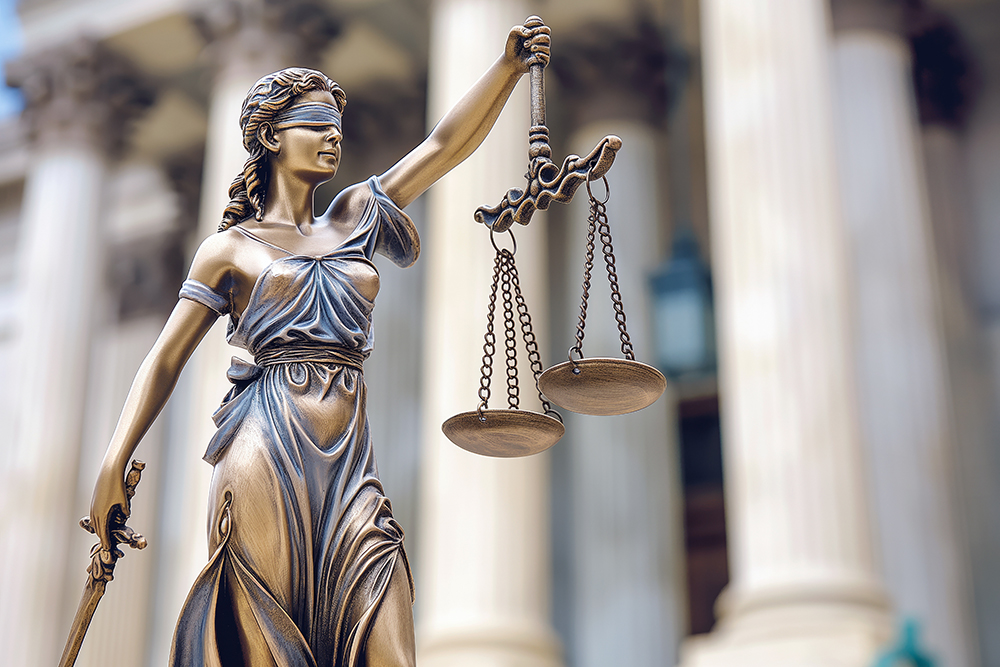
OWI/DWI/DUI Second Offense in Louisiana
If you are facing your second offense for DUI, DWI or OWI in the state of Louisiana, you probably have several questions about the charges you face – what the penalties are, what consequences you can expect and what strategies can help you avoid a conviction. In the following guide, The Claiborne Firm will answer your questions, educating you and empowering you to fight back to see your charges reduced, dismissed, or acquitted.
While most people are aware of the concepts of DUI (driving under the influence) and DWI (driving while intoxicated), the official term in the state of Louisiana for driving while under the influence of either drugs or alcohol is OWI, or operating while intoxicated. While these terms can be used interchangeably, and often are, even by law enforcement, the Louisiana Revised Statutes specifically reference the charge as OWI.
This is just a matter of semantics because OWI means the same thing as DUI or DWI – operating a motor vehicle of any kind while demonstrating blood alcohol content (BAC) or .08% or more, or while under the influence of schedule I-V controlled substances.
The taste of proving an OWI charge falls to the prosecution, who must establish several elements beyond a reasonable doubt. The first element is that the defendant was operating or had physical control over the vehicle, proven through physical evidence, eyewitness testimony, video footage, and the defendant’s admission. The second element the prosecution must prove is that the defendant was intoxicated, demonstrating this through tests of urine, blood, or breath or evidence gathered by law enforcement such as observations and field sobriety test results. This intoxication can be due to alcohol, controlled substances, or even legal drugs that impair the ability to drive.


Is a Second Offense OWI/DWI/DUI a Felony in Louisiana?
Generally, no. If it is a simple matter of police discovering the defendant had been driving while under the influence, they will usually pursue it as a misdemeanor. However, certain factors can elevate an OWI to a felony – for example, if the inciting incident involved an injury or death – which leads to more serious penalties and consequences.
Do OWI/DWI/DUI Charges Fall Off After a Certain Period?
Louisiana law asserts a “lookback” or “washout” for 10 years. Essentially, this means that convictions you received more than 10 years ago will likely not count against you as a prior offense for sentencing purposes. Some jurisdictions may also refer to this time frame as a “cleansing period” or “prior offense consideration period,” but all these terms mean the same thing.
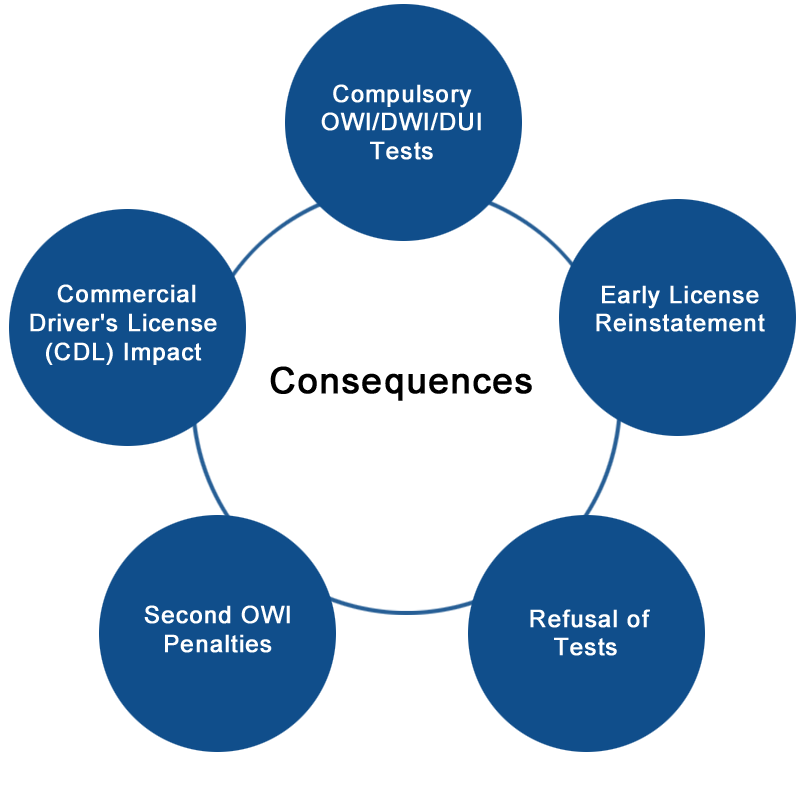 Can Police Force You to Get an OWI/DWI/DUI Test?
Can Police Force You to Get an OWI/DWI/DUI Test?
They can, but they must first obtain what is known as a “blood search warrant” to compel you to have your blood tested. However, just like results from breath testing, these results can be challenged in court.
Can I Get My License Back Before the Suspension Period Ends?
The general procedure with OWI is to suspend your license immediately upon being charged. However, if you contest your driver’s license suspension within the first 15 days, you may be able to continue to drive on a restricted or hardship license, letting you commute for work, school, or medical appointments. This may require the installation of an ignition interlock device (IID) or other conditions. Your attorney can help you take swift action to get this resolved.
What Happens if I Refuse a Breathalyzer or Chemical Test for My Second OWI?
Not only can your refusal be used as evidence against you during criminal proceedings, and expose you to further penalties, but it also generally leads to an automatic two-year suspension of your license.
What Happens to a Commercial Driver’s License (CDL) Holder for a Second Offense?
Because of strict regulations surrounding commercial drivers, a second OWI conviction automatically results in a lifetime disqualification of your CDL. This is one of many reasons why it is important to have an attorney act quickly to challenge the charges against you.
Challenging the Breathalyzer Test
While the results of a breathalyzer test can make for damning evidence, the accuracy and reliability of these results can be challenged on several grounds. One strategy would be to scrutinize how well the device was calibrated or maintained, looking for errors in operation or lack of training.
There are also factors in your own body that can skew a breathalyzer’s results, ranging from exposure to certain chemicals to medical conditions like acid reflux, diabetes, or ketosis from a specialized diet. Even belching or using mouthwash can significantly impact results. It is also possible to use the rising BAC defense, which states that the BAC was below the legal limit when you were driving, but rose by the time a test was administered.
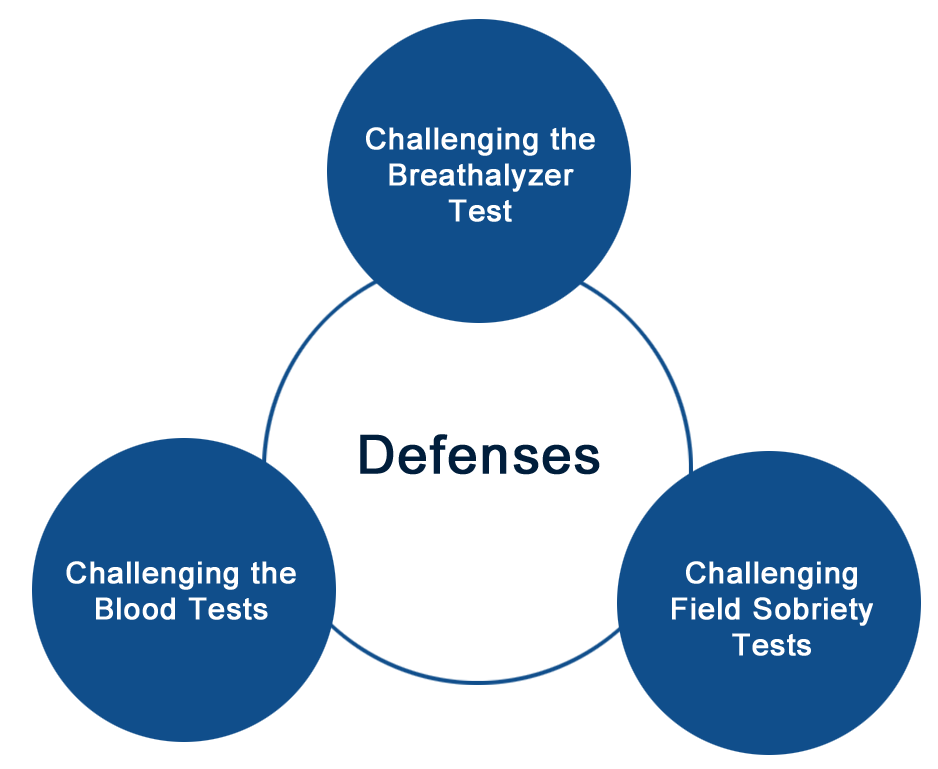 Challenging Field Sobriety Tests
Challenging Field Sobriety Tests
As with breathalyzer results, there are several ways to challenge the results of field sobriety tests (FSTs). One way is to question the actions of the officers themselves, whether they followed the correct procedures in administering the test or were given the proper training. You can also argue that your performance on the FST was affected by outside factors such as mental or physical conditions, fatigue, unstable conditions on the roadway where the test was administered, or even restrictive clothing or footwear.
Almost any factor can cast doubt on the results of an FST – inconsistencies between the arresting officer’s report and the video evidence, signs of bias or subjective judgment by the officer, or issues with your physical fitness.
Challenging the Blood Tests
While a blood test offers a more comprehensive picture of a person’s BAC than a breathalyzer test, it is not immune from having its results challenged in court. One strategy is to examine the chain of custody, looking for signs of tampering, improper handling, or storage which could have contaminated the sample. At each step in the chain of possession, your attorney can question the qualifications of every person involved in analyzing the sample and seek out any issues with the timing of the test.
Your attorney could also demonstrate medical conditions you have that skewed the results, or find points during testing where your constitutional rights were violated. And just like with a breathalyzer, it is possible to challenge the accuracy of the equipment, and whether it was calibrated and used correctly.
Protect Your Driving Privileges
The priority following an arrest for OWI should be to safeguard your ability to drive. With Louisiana law requiring an automatic suspension, you must act within the first 15 days to contest that suspension if you want to be able to commute for work, transport children to school, and continue supporting your family without disruption.
This administrative hearing, as outlined in Louisiana Revised Statutes 32:667A(2), is vital in preserving your ability to drive while you await trial. Thankfully, our firm has a solid track record of helping clients retain their driving privileges while building a strong defense of a criminal trial.
Penalties and Consequences for Second Offense OWI
If charged with a second OWI conviction following a prior conviction within the year, you can expect to face jail time, fines, and other consequences. Your circumstances may vary, depending on the specifics of your case, but the general outline as described in Louisiana law is as follows.
The mandatory minimum jail sentence for a second offense OWI is 48 hours, with a potential range totaling between 30 days and six months. The total jail sentence will be determined by several factors including your BAC level, any accidents that resulted, the presence of minors in the vehicle, or any other prior convictions. However, the mandatory minimum of 48 hours cannot be suspended, reduced, or replaced by alternative penalties.
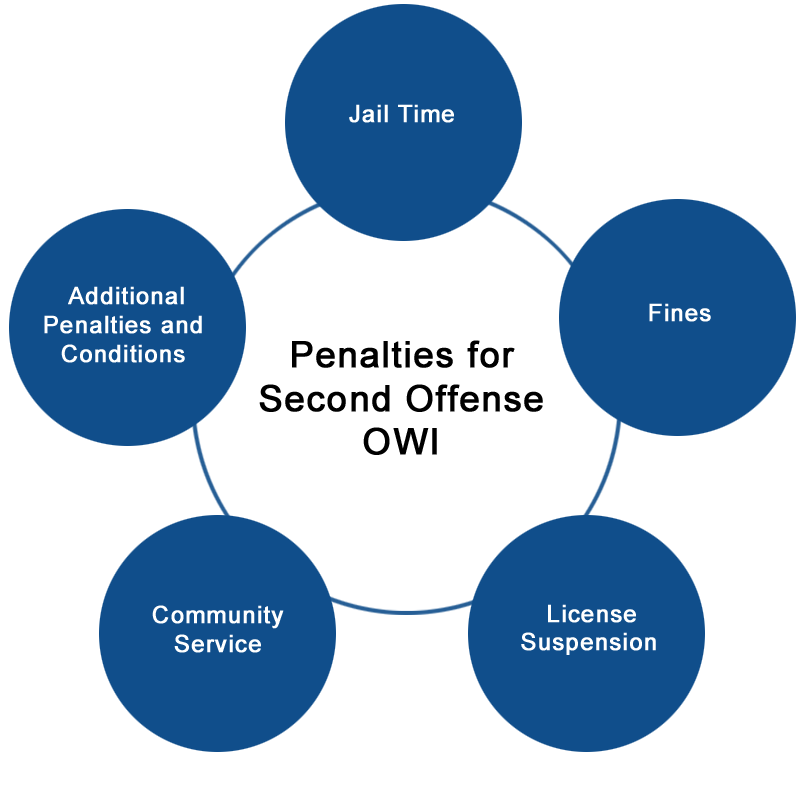 Fines for a second offense OWI can range from $750-$1,000. The money collected from these fines helps police cover costs of training and enforcement of OWI laws, bankrolls court costs associated with adjudicating OWI, and funds substance abuse and treatment programs.
Fines for a second offense OWI can range from $750-$1,000. The money collected from these fines helps police cover costs of training and enforcement of OWI laws, bankrolls court costs associated with adjudicating OWI, and funds substance abuse and treatment programs.
For a second offense, your driver’s license can be suspended for up to 24 months, with the possibility of extending that suspension to four years with a BAC of .2% or higher. As mentioned earlier, this can be avoided through an administrative hearing to challenge the suspension. However, you may still have to attend substance abuse treatment programs, consent to have an IID installed in your car, pay fines and fees, endure higher insurance premiums, and possibly pass a driver’s test.
On top of all this, you may be required to serve up to 240 hours instead of jail time. This community service is monitored by the courts or their associates and must serve as a benefit to the community. This not only alleviates the burden of crowded prisons, but it also provides an avenue for continuing work or school while serving a sentence. Louisiana law also requires a mandatory evaluation and treatment for those charged for the second time, assessing your relationship with drugs or alcohol and determining if further treatment or support is needed.
All of these consequences outlined above assume a BAC above .08% but below .15%. At that BAC level, additional penalties will most likely apply. There are also additional consequences for various factors surrounding the arrest. For example, if a minor aged 12 or younger was in the vehicle at the time, this constitutes Child Endangerment under Louisiana law, requiring a further 10 days mandatory minimum in jail. Failing to comply with any conditions set by the court can also result in revocation of any probation granted.
Refusing the Breathalyzer Test
Under Louisiana law, you automatically consent to blood, breath, or urine testing just by operating a vehicle on state-owned roads. Known as the “implied consent” law, this law requires law enforcement to test you if they suspect you of driving under the influence.
You do have the right to refuse the test but know that you could face significant consequences. The first is an automatic suspension of your license for 90 days. If you request an administrative hearing within 15 days, however, you can potentially reduce this suspension period.
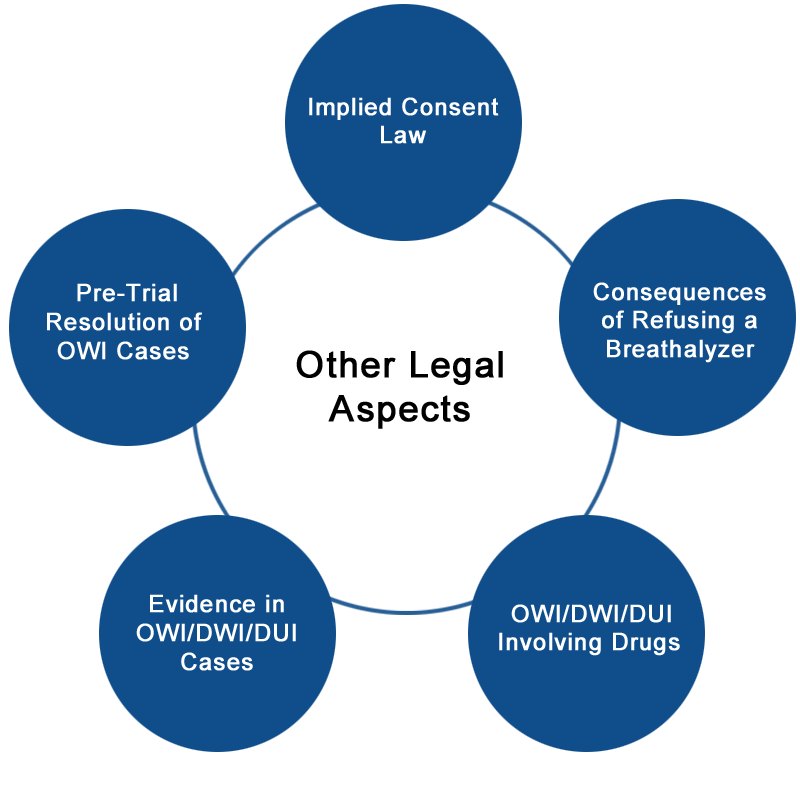 OWI/DWI/DUI Drugs
OWI/DWI/DUI Drugs
Louisiana law doesn’t just describe consequences for driving while under the influence of alcohol. Under the umbrella of OWI, you can also be arrested for driving under the influence of controlled substances. This can include controlled dangerous substances as outlined in Schedules I-V, prescription or over-the-counter medications, or a combination of drugs and alcohol.
Proving an OWI involving drugs requires the prosecution to demonstrate intoxication the same way they would in proving intoxication through alcohol. Blood tests, breath tests, FSTs, and the officer’s observations all come to bear.
Most OWI Cases Don’t Go to Trial
At The Claiborne Firm, we’ve helped countless clients who find themselves being charged with their second OWI, and we can confidently say that very few of those cases ever made it to a courtroom. Instead, they were successfully negotiated away beforehand, bolstered by our skill in challenging the admissibility of evidence.
Alternatives to a Second Offense DWI Conviction Besides an Acquittal or Dismissal
In most cases, the Claiborne Firm will strive to see your charges acquitted or dismissed. Otherwise, some alternatives can be pursued under Louisiana law as an alternative to a formal charge. Depending on the circumstances of the case and the discretion of the court, it could be possible to plea bargain down to a reduced charge such as reckless driving. It’s also possible to participate in diversion programs or deferred adjudication, leading to the dismissal of all charges pending completion of alcohol education classes.
It is also possible to enter into pretrial intervention, enter into treatment programs for alcohol and substance abuse, provide community service, and demonstrate remorse to reduce potential consequences.
Challenging and Preparing to Beat Your Second Offense OWI Charge
Each case is different, with circumstances and factors that are unique, so no two cases will be defended in the same way. But the Claiborne Firm has built our reputation on relentlessly defending our clients, using some of the strategies below.
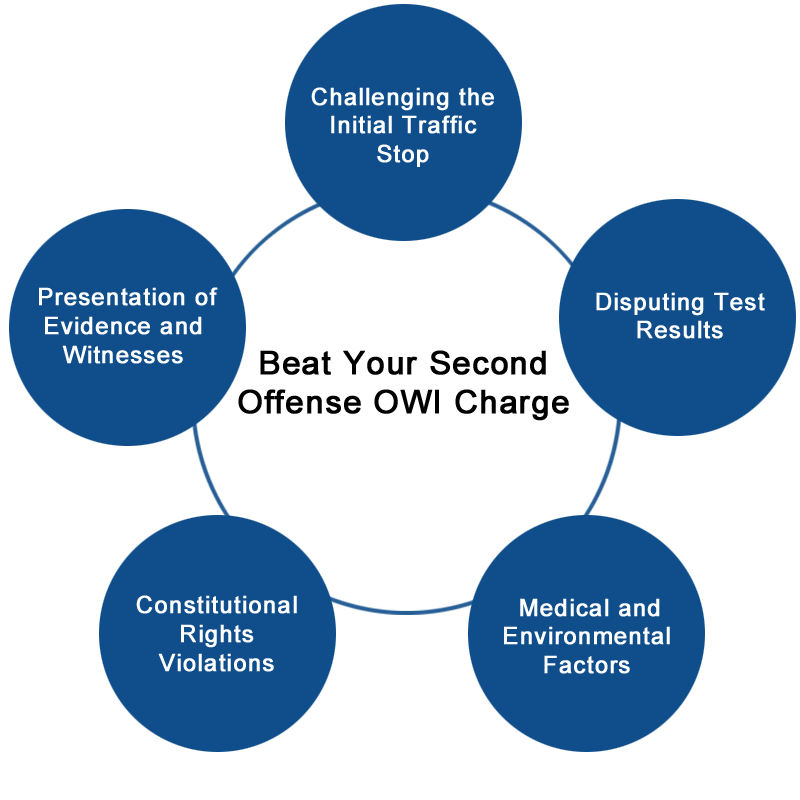 One method is to challenge the circumstances surrounding the initial traffic stop. This could mean arguing that the officer didn’t have reasonable suspicion to make the stop in the first place or didn’t have probable cause to arrest you. As mentioned before, the results of any blood, breath, or urine tests, along with the results of an FST, can all be disputed. This can mean questioning the accuracy or calibration of equipment, investigating the officer’s training and whether they followed procedure, or contesting how tests were administered.
One method is to challenge the circumstances surrounding the initial traffic stop. This could mean arguing that the officer didn’t have reasonable suspicion to make the stop in the first place or didn’t have probable cause to arrest you. As mentioned before, the results of any blood, breath, or urine tests, along with the results of an FST, can all be disputed. This can mean questioning the accuracy or calibration of equipment, investigating the officer’s training and whether they followed procedure, or contesting how tests were administered.
Evidence may show that your own medical conditions, food intake, or use of mouthwash may have impacted BAC results. A thorough investigation can reveal gaps in the chain of custody where blood or urine samples were mishandled, or put forward the possibility that your BAC only rose above the legal limit after you were in control of the vehicle.
There are also your constitutional rights to consider. Your attorney may work to show that your rights were violated either through illegal search and seizure conducted without a warrant or probable cause. The burden of proof lies with the prosecution, and as such it’s possible to show a lack of evidence that you were impaired or were even driving the vehicle at the time. Your attorney can bring forward witnesses to support your version of events, analyze dashcams or surveillance footage to show contradictions with the official report and create an alibi.
There are countless ways to challenge a second offense OWI charge, but their success all boils down to one thing: preparation. At the Claiborne Firm, we dig deeper to learn the facts of your case inside and out, stepping up to the negotiating table with a greater understanding of the situation than the prosecution. This gives us an edge in fighting for your freedom.
Countless cheap attorneys out there will tell you they can win for you. But before you take the cheapest option, ask them to show you their results. Find out how, exactly, they plan to defend you. Then ask us, and find out what a difference our exhaustive approach and extensive experience can make.
It all starts with a call to (504) 294-8552. Talk to us, get a better understanding of how together we can take back control of your life, and then sleep soundly knowing you’re represented by a firm that stops at nothing to defend your freedom.
Call (504) 294-8552 or Schedule a Free Case Evaluation Online
